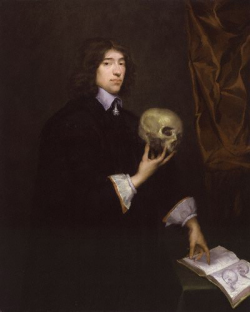Sir William Petty

- Born
- 26 May 1623
- Died
- 16 December 1687 (age 64)
Sir William Petty was a physician, statistician and inventor in the 17th century. He was a promoter of gaining knowledge through empirical scientific proof and cofounded the Royal Society in 1660.
Petty was born in England but left home, aged 14, on a ship as a cabin boy. After an incident that resulted in Petty breaking his leg, he was put ashore in France. The developed an interest in anatomy and mastered French, Latin and Greek. His impressive thirst for knowledge propelled him to study medicine at the Universities of Leiden in Holland, Paris (now divided into 13 institutions) and upon returning to England at Oxford. Successively, he went on to become a physician and a professor of anatomy and chemistry at Oxford by the age of 27.
During his time at Oxford he met many of his contemporaries and science advocators like Christopher Wren, John Wilkins and Robert Boyle. At this point of the 17th century science didn’t yet exists as a profession in the way it does today. Instead, scientific discoveries were often made by philosophers and theorists. Oxford, however, was the cornerstone of a new way of thinking. It was there that, in the 1660s, Petty along with his colleagues formed the prestigious Royal Society. The Society was based on the ideas that scientific learning should be founded on experiential and pragmatic observation, and that such knowledge should be recognised, promoted and available to all.
At the age of fifteen, he was master of such a compass of knowledge in the languages, arithmetic, geometry, astronomy, navigation, practical mathematics, and mechanical trades, as few are capable of attaining in the longest life.
Rev James Granger, A Biographical History of England, from Egbert the Great to the Revolution, 1775
Petty’s inquisitive nature and scientific mind made him an innovation machine. He designed an early form of catamaran and first proposed attaching engines to boats – creating the precursor to the modern motorboat. He also conceived of a mechanical grain planter and, aged 24, patented a ‘double-writing’ instrument that produced an extra copy of whatever a writer put down on paper.
As many other scientists of his time, Petty also involved himself in matters of the government. His logical mind worked to make every part of his life as efficient and beneficial as possible, and out of this thinking he formed the bedrock of modern economics. His most important invention was the concept of GDP, gross domestic product. GDP evaluates the monetary worth of all the services within a country and is now an invaluable and ubiquitous tool in indicating a country’s economic wealth. Petty also went on to show why the money supply and banks matter and how lasting unemployment affects the economy.
Petty was knighted by Charles the Second, and in 1661 appointed Inspector General of Ireland, where he was living and working at the time. He died in London in 1687 and was buried in his home town of Romsey in Hampshire.



